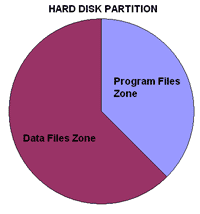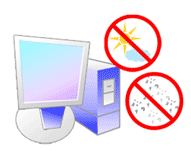Tips to Prevent Data Loss
Prevention is always better cure. In order to avoid data loss situation, some of the following steps may help.
- Backup
- Practice good working habits
- Use an anti-virus software and keep it updated
- Protect against power surges with an UPS
- Keep your machine dry in a dry, shaded, dust-free and well-ventilated area
- Do not over-tweak your system
- Avoid moving your computer or notebook when it is in operation
- Safeguard your computer
- Practice disk maintenance
- Pre-empt failure
- Do not listen to tell-tale technique
![]()
GOLDEN RULE NO 1 - BACKUP
There is nothing that can replace backup to prevent data loss and avoid expensive recovery.
Backup simply means you are keeping at least one copy of the original data, preferably not in the same disk media. Backup could often be misconstrued as the followings:
- I backup my notebook data in the external USB drive and then delete the original data in notebook.
- I backup my data from the first partition to the second partition in the same physical disk.
Another pitfall is after backup, the backup data is never verified by the user until disaster strikes. Often, much to the horror of the user, the backup data was found to be corrupted, invalid or wrongly done.
If the data is important, store your backups at an off-site location. This helps to protect your backup from damage in case of a fire or disaster.
One practical problem while practising backup is you need to stop work for such operation to take place. Often, this is not possible. The issue is often compounded by increasing data size, such as your ever-growing mailbox. Every backup operation could become a real pain if you have a busy schedule.
Whatever the situations, one fact remains - Diligent backup is a disciplinary act and the only way for you to circumvent data loss disaster.
Read more on how to learn more about data backup.
PRACTISE GOOD WORKING HABITS
While working on your computer, if you choose the correct steps, it will help you to prevent major data loss and in the worst case scenario, will help you to increase the chance of successful recovery.
- Partition your drive into a program and data zone. Should some thing happen to the program partition and unless it is a total disk failure, you still stand a good chance to retrieve the data intact from the data partition. Read more details on disk partitioning.

- If you have a choice, adopt NTFS file system volume instead of FAT32 file system. Not only it gives you more flexibility in length of filenames and directory, security control, in case of disk corruption, you stand a greater chance of good recovery.
- Keep your file names and directory simple and direct which is ideal for direct backup to other media such as CDR/DVD.
- If you can help it, do not use file or disk encryption. In case of disk crash, recovery would be more difficult. If you really have to do this for reason of data confidentiality, you may want to protect only those selected files rather than everything.
- If you are not using the computer for long period of time, turn it off. Do not put on power save mode and leave it through the night as it stands a greater chance of power surge or unknown damages.
USE AN ANTI VIRUS SOFTWARE AND KEEP IT UPDATED
Anti-virus software is designed to protect your computer against malicious computer viruses, trojan and other malicious-ware. Some virus infections can delete, modify your data secretly causing your computer to crash. Most viruses nowadays spread through internet and it is a real must to have a secure Anti-Virus software with firewalls.
Be sure to update your Anti-virus software with the latest patch and signature files for maximum security. Anti-virus software without latest update is very vulnerable to attacks by newest strands of viruses which are appearing everyday.
PROTECT AGAINST POWER SURGES WITH AN UPS
If your data is important, an un-interrupt power supply protects your computer and data during a power failure. The spare battery in the UPS gives you ample time to save your documents and shut down Windows properly so that you will not lose any files or damage any hardware components.
KEEP YOUR MACHINE DRY IN A DRY, SHADED, DUST-FREE AND WELL-VENTILATED AREA
 |
Never leave your computer near places where it is directly exposed to rain, sun or humidity.
Such conditions have the tendency to cause rusting and damage to your hardware parts.
DO NOT OVER-TWEAK YOUR SYSTEM
Avoid modifying your system registry or over-clock your hardware to yield performance boost unless you're absolutely sure of what you're doing. You don't wish to fry your computer.
AVOID MOVING YOUR COMPUTER OR NOTEBOOK WHEN IT IS IN OPERATION
You definitely would not wish for your power cord to fall off and cause a data corruption and physical damage to your hard disk such as a head crash while working on a project. Vibration or impact may also cause your hard disk to crash.
SAFE-GUARD YOUR COMPUTER
Do not share or allow network access to any unknown users. Your computer data can be prone to theft and modification if anyone on the network can access your files freely.
When you receive mails with attachment from unknown senders, do not open it.
PRACTISE DISK MAINTENANCE
Perform disk defragmentation once every few months. Such process ensures the data is arranged more contiguously and is easier for access or recovery.
Clean up temporary files and unused files from time to time. This helps to keep your hard disk on top form.
PRE-EMPT FAILURE
You know it's time to start backing up all your data files when your hard disk starts producing funny noises and your system starts getting cranky.
Some disks may not need data recovery service. Learn more about some simple do-it-yourself data recovery and perform your own preliminary hardware checks before you consider full-fledge data recovery service by the professionals.
DO NOT LISTEN TO TELL-TALES TECHNIQUE
There are many popular "cool" tricks found in newsgroup. One such example is the suggestion to put the disk into a freezer overnight so miracle will fall the next day.
There is real danger that when you take up the drive, water gets condensed on the disk causing imminent failure.
Another instance is when some one had accidentally done a format, the other guy suggested to the poor victim to "unformat" it by issuing the command "format /u".
Actually this will perform another round of "unconditional" format and does not help at all.
So read and act wisely.



